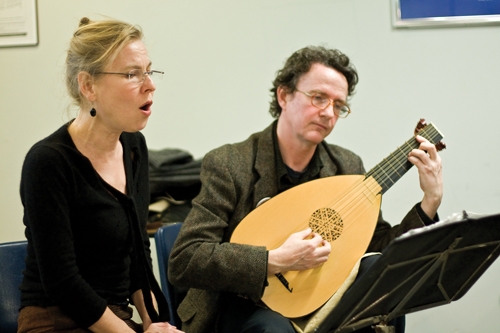The Musicians in Ordinary played a free show of music from Shakespeare’s plays last week
John Nyman
Senior Staff Writer
@excalweb

Last week, lutenist John Edwards and soprano Hallie Fishel gave York a taste of some popular music hits—from about 400 years ago.
The Musicians in Ordinary,who have devoted their careers to recreating music from the early Renaissance, treated York students on February 7 to a presentation of music from Shakespeare’s plays. The musicians recreated songs from the classic comedy Twelfth Night as well as music from Hamlet’s “cult of melancholy”—essentially the 17th century’s version of Emo.
As you might expect from musicians with a keen interest in literature and strong academic ties, Edwards and Fishel are serious about historical accuracy. Edwards’ replica 1580s lute is made with the exact materials used in the 16th century, including burned and stretched sheep’s guts for frets and strings. The duo also played and sang from original manuscripts of Renaissance-era voice notation and lute tablature.
Though some published materials from Shakespeare’s time remain, recreating the music Elizabethan and Jacobean audiences would have heard requires research, effort, and creativity. Unsatisfied with much of the
pre-existing scholarship on the topic, Edwards and Fishel do a lot of the work behind preparing their songs themselves.
“Not a lot remains from Shakespeare, so we do a lot of piecing together,” Fishel says. Some of the duo’s tactics involve grafting Shakespeare’s lyrics onto other published music from the period, or even re-imagining his plays’ soundtracks based on multiple sources. Still, nearly all of the music still known from Shakespeare easily fit into Edwards and Fishel’s one and a half hour performance.
The Musicians in Ordinary’s work isn’t only a curiosity. Both Edwards and Fishel agreed that seriously reconstructing these songs is important to the meaning behind Shakespeare’s works. Even the idiosyncrasies in spelling and punctuation between modern and original editions can skew how we read, or hear, a song.
“If we’re working from a modern edition that has the spelling cleaned up, we’re missing a lot of the clues,” Fishel says.
Regardless of their extreme attention to detail, The Musicians in Ordinary were passionate, engaging, and entertaining for even the least dedicated fans of the Bard. From the dying falls of melancholic compositions to a bawdy sing-along with the entire group, Edwards and Fishel’s songs were a treat for the ears and a fascinating look into the past.


